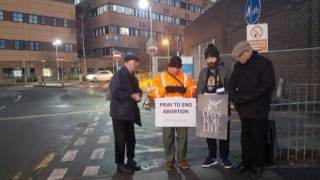Pro-lifers respond to one-sided BBC article
- |

Article claims prayer group’s presence is “distressing”
BBC journalist Caroline Lowbridge wrote an article about 40 Days For Life’s new prayer vigil outside Queen’s Medical Centre in Nottingham. She quoted non-specified hospital staff as saying that the vigil was ‘distressing’, but did not explain why a group of 4 people praying (as pictured) was so intimidating. The closest she got to an explanation could be forgiven for causing offense for being sexist. Dr Pam Lowe of Aston University – an abortion activist and BPAS supporter, is quoted by Lowbridge:
"All the evidence suggests that women do find this incredibly intimidating and distressing and we think it constitutes a form of street harassment. It's all very well for them to say 'we're peaceful', and that might be the case, but women approaching don't know that, they don't know who these people are. You have to understand that women generally are nervous about public places or can be nervous if they see a group of strangers."
Pro-life journalist Caroline Farrow responded to this bizarre statement on Twitter:
“Women are generally nervous of public places and whenever they see a group of strangers”? Infantilising of women is not feminism. https://t.co/M7VPMEL3Fv
— Caroline Farrow (@CF_Farrow) February 14, 2018
The BBC article said of 40 Days For Life’s efforts:
“The movement claims to help women by showing them an alternative to abortion and claims many women have been grateful for their presence outside clinics. The BBC asked to speak to some of these women, but 40 Days for Life has not provided any contact details.”
Claire McCullough of The Good Counsel Network – actively involved in peaceful prayer and engagement outside abortion clinics and in counselling women – was put in touch with Caroline Lowbridge to introduce her to women who have been helped, but there was never any response. McCullough has challenged the article’s account saying:
“This journalist went undercover to a 40 Days meeting and then contacted them to ask to speak to mums. When I was contacted I called her and left a message with her colleague. She never got back to me. I called her at 5.36 on Thursday 8th of February as my mobile phone records will verify. In fact, I got in touch with them last week offering mums who would like to speak. Unfortunately, they did not return my call so that is not the case. Perhaps the journalist didn't get the message? But I did make the call and her colleague said she would let her know.”
Article “deliberately misrepresenting”
Robert Colquhoun, Director of International Campaigns for 40 Days For Life has responded calling the article ‘inaccurate’ and has called for its removal from the BBC website for deliberately misrepresenting 40 Days for Life. Responding to the allegations of harassment and intimidation Colquhoun says:
“I am not aware of anybody who has been harassed or intimidated at any of our vigils in the past 7 years. There is no evidence I am aware of that demonstrates anyone being harassed or intimidated by 40 Days for Life volunteers in Nottingham.”
Call for article to be removed
Please write to the BBC complaints department and:
- Express disappointment in the way in which the article misrepresents 40 Days For Life.
- Request that the article in its current form be removed from the BBC website.
- Request that the BBC redress the balance by featuring an article where women who have been helped by groups like 40 Days For Life and the Good Counsel Network are allowed to present their story.
